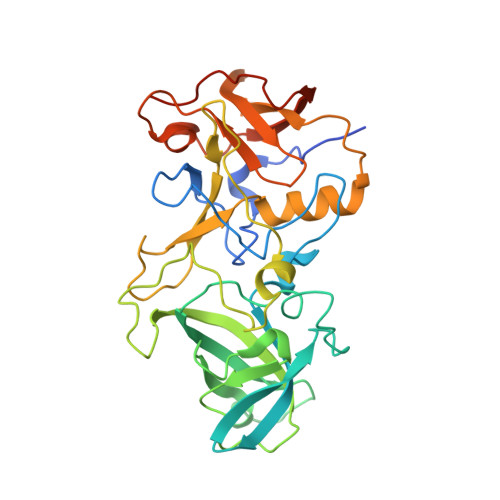Structural Insight into Terminal Galactose Recognition by Two Non-HBGA Binding GI.3 Noroviruses.
Wang, C., Kang, H., Tan, M., Cong, J., Su, D., Li, X., Chen, Y.(2022) J Virol 96: e0042022-e0042022
- PubMed: 35658530
- DOI: https://doi.org/10.1128/jvi.00420-22
- Primary Citation of Related Structures:
7EQS, 7EQT, 7EQW, 7ER0, 7ER1 - PubMed Abstract:
Human noroviruses (huNoVs) cause epidemic acute gastroenteritis using histo-blood group antigens (HBGAs) as host receptors or attachment factors to initiate an infection. While most huNoVs have been shown to bind HBGAs, some known clinical isolates, such as GI.3 DSV and VA115, do not recognize any HBGAs and thus the molecular mechanism behind their infections remains elusive. In this study, we provided both phenotypic and structural evidence to show that huNoV DSV and VA115 recognize a group of glycans with terminal galactoses as ligands. First, through glycan array we found that both DSV and VA115 protruding (P) domain proteins bound two oligosaccharides that share common terminal galactoses. Then, by determination of the crystal structures of DSV/VA115 P proteins in complex with Galα1-3Galβ1-4Glc and/or NA2 N -Glycan, respectively, we showed that the terminal galactose is the main saccharide recognized by the two viral proteins. Our data demonstrated that GI huNoVs can interact with non-HBGA glycans through their conserved galactose binding site, shedding light on the mechanism of huNoV adaptation through recognizing new glycan receptors to facilitate their widespread nature in human population. These findings are also of significance in strategy development for huNoV control and prevention, as well as development of antiviral drugs. IMPORTANCE Human noroviruses (huNoVs) are the most important viral pathogens causing epidemic acute gastroenteritis worldwide. Previous studies indicated that histo-blood group antigens (HBGAs) are critical host-susceptibility factors affecting huNoV host susceptibility, host range, and probably prevalence. However, certain huNoVs, such as GI.3 DSV and VA115, do not recognize any HBGAs. This implies that other unknown host factors might exist and the molecular mechanism underlying their host receptor recognition or attachment remains elusive. In this study, we found that purified capsid protruding domain proteins from two GI.3 huNoVs specifically bind two glycans that contain a common terminal galactose. We solved the crystal structures of the complexes at atomic resolution and validated the vital amino acids involved in glycan recognition. Our findings elucidate the mechanism of GI.3 huNoV-non-HBGA glycan interaction, which explains why GI.3 virus strains could not bind human HBGAs, paving a way to the prevention and treatment of huNoV-associated diseases.
- National Laboratory of Biomacromolecules, Institute of Biophysicsgrid.418856.6, Chinese Academy of Sciences, Beijing, China.
Organizational Affiliation:
















